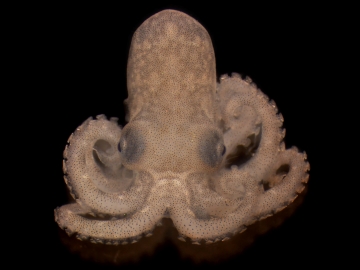740624_Oberrima_QiazHua_360 px width.jpg

Warmer ocean temperatures might threaten the hatching and vision of the southern keeled octopus. Image courtesy of Dr. Qiaz Hua
Hotter oceans are bad for just about everyone. They can destroy coral reefs, cause fish to move to new ranges, and rev up monster hurricanes.
There are problems for octopuses as well. Adults of some species aren’t getting as big as they used to, for example. And a recent study found that the still warmer waters we’ll see in the future could cloud their vision. That would make it harder to catch a meal or get away from predators.
Researchers studied the southern keeled octopus, which is found in shallow waters around Australia. It’s a small octopus that burrows into the sand during the day, then comes out at night to hunt.
The scientists placed females in tanks at three different temperatures: a control temperature of 66 degrees Fahrenheit; the modern summer temperature of 72 degrees; and 77 degrees, which is the projected summer temperature for the end of the century.
Almost all the eggs laid in the two cooler tanks hatched. But two of the three mothers in the warmest tank died while tending their broods, so none of the eggs hatched. The mother of the third brood survived, but less than half of her eggs hatched.
Scientists also studied proteins in the octopus embryos that are important for vision. They keep the lenses clear, and they produce pigments that capture light. The study showed that the warmer the water, the less effective the proteins were. So octopuses that hatch in a hotter ocean might need glasses to find their way.

